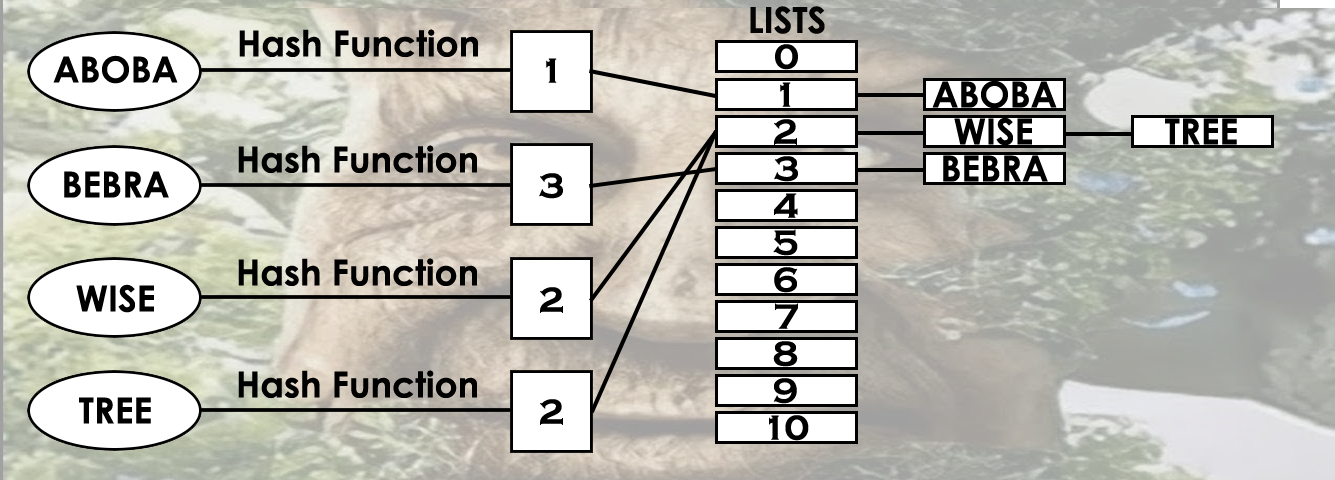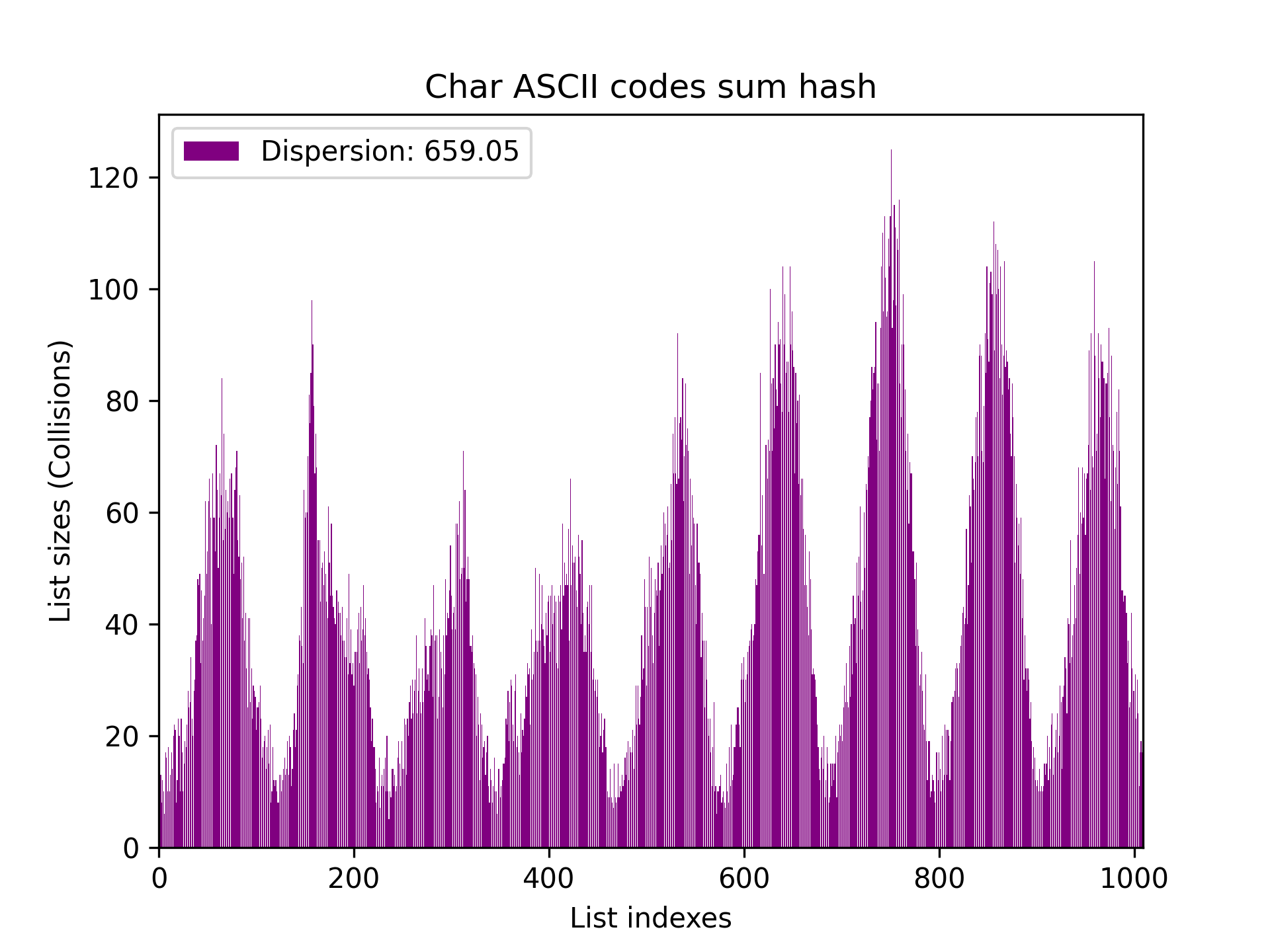For average hash table enjoyers.
A hash table is an abstract data type that maps keys set to values set using hash function.
However, there is a disadvantage, which is that two keys can have the same hash. This is called collision. So we are going to use chain method to avoid it. More information about it can be found here: Click!
It can be represented in the following form:
It is also important to mention that size of hash table is a prime number: Why is it so?
Goals of this project:
- Research the properties of hash functions and choose the best of them, depending on distribution;
- Implement different types of assembly optimizations to speed up the searching process.
Technical parameters:
- CPU: Intel Core i5 11300H (AVX instructions: AVX-512)
- Compiler: g++ (Ubuntu 11.3.0-1ubuntu1~22.04) 11.3.0
- Table size: 1009
- Keys set: Words of "The adventures of Sherlock Holmes" (41935 unique words)
- Utilities used: Valgrind, Callgrind, Kcachegring
P.S. Average CPU temperature was 27.9
It’s obvious that the more collisions we have - the slower search of values we'll get. So we need to select the function with the least number of collisions of these:
This wonderful function always gives the same value on different keys:
size_t constHash (const char *string)
{
return 1;
}Kinda fun, but it's the worst hash function I can imagine...
Returns ASCII code of string's first symbol:
size_t firstCharAsciiHash (const char *string)
{
return (size_t) string[0];
}This function is better than previous and it can be used on small text. However, the large text doesn't give a chance to it.
Returns length of string:
size_t stringLengthHash (const char *string)
{
return strlen(string);
}We have even more collisions on that function. English words are not very long as we can see.
Returns sum of symbols ASCII codes:
size_t charSumHash (const char *string)
{
size_t hash = 0;
for (size_t symbolIndex = 0; string[symbolIndex] != '\0'; symbolIndex++)
hash += (size_t) string[symbolIndex];
return hash;
}Dispersion became slightly better (~250).
For average left Twix stick enjoyers:
size_t rollingLeftHash (const char *string)
{
size_t hash = 0;
for (size_t symbolIndex = 0; string[symbolIndex] != '\0'; symbolIndex++)
{
size_t firstPart = hash << 1;
size_t secondPart = hash >> 31;
hash += (firstPart | secondPart) ^ (size_t) string[symbolIndex];
}
return hash;
}Less dispersion - more search speed! (More speed to the God of the speed u-ha-ha-ha)
For average right Twix stick enjoyers:
size_t rollingRightHash (const char *string)
{
size_t hash = 0;
for (size_t symbolIndex = 0; string[symbolIndex] != '\0'; symbolIndex++)
{
size_t firstPart = hash >> 1;
size_t secondPart = hash << 31;
hash += (firstPart | secondPart) ^ (size_t) string[symbolIndex];
}
return hash;
}Interesting result: ROR's Dispersion is less than the ROL's Dispersion by ~6 times. Usually the ROL's results are better. Apparently the sample has a big impact.
Based hash function for string hashing:
size_t polynomialRollingHash (const char *string)
{
static const size_t power = 53; // Good value for letters in upper and lower cases
size_t hash = 0;
size_t currentPower = 1;
for (size_t symbolIndex = 0; string[symbolIndex] != '\0'; symbolIndex++)
{
hash += (size_t) string[symbolIndex] * currentPower;
currentPower *= power;
}
return hash;
}It gives dispersion about ~42. Bingo! I will use this hash function for the next part, because it has a great potential for optimizations and small dispersion.
We have already selected hash function, so now we need to consider ways to speed up hash table.
We will use valgrind with callgrind tool and kcachegrind for callgrind output vizualization.
P.S. All measurements are made 4 times for better accuracy.
Let's take a look at baseline.
| Version | Time | Absolute speedup | Relative speedup |
|---|---|---|---|
| Baseline | 4.11 +- 0.03 | 1 | 1 |
Kcachegrind output:
First we will try to use compiler optimization -O2, to boost our perfomance.
| Version | Time | Absolute speedup | Relative speedup |
|---|---|---|---|
| Baseline | 4.11 +- 0.03 | 1 | 1 |
| -O2 | 2.675 +- 0.019 | 1.54 | 1.54 |
Profiler data:
As we see from profiler __strcmp_avx2 is on first place in Self rating. So we need to optimize the element compare function (strcmp) to improve performance.
Optimizing strcmp with inline assembler:
Code
int strcmpASM (const char *string1, const char *string2)
{
int result = 0;
asm volatile
(
".intel_syntax noprefix;"
"1:"
"lodsb;"
"scasb;"
"jne 2f;"
"test al, al;"
"jne 1b;"
"xor eax, eax;"
"jmp 3f;"
"2:"
"dec edi;"
"sbb eax, eax;"
"3:"
".att_syntax"
: "=a" (result)
: "S" (string1), "D" (string2)
: "memory"
);
return result;
}| Version | Time | Absolute speedup | Relative speedup |
|---|---|---|---|
| Baseline | 4.11 +- 0.03 | 1 | 1 |
| -O2 | 2.675 +- 0.019 | 1.54 | 1.54 |
| first opt. | 0.4865 +- 0.0011 | 8.45 | 5.5 |
Profiler data:
We see that our hash function is bottleneck now. Let's try to use our own hash function rewrited on assembler.
| Version | Time | Absolute speedup | Relative speedup |
|---|---|---|---|
| Baseline | 4.11 +- 0.03 | 1 | 1 |
| -O2 | 2.675 +- 0.019 | 1.54 | 1.54 |
| first opt. | 0.4865 +- 0.0011 | 8.45 | 5.5 |
| second opt. | 0.6185 +- 0.0025 | 6.65 | 0.77 |
Profiler data:
Let's see this:
Code
global polynomialRollingHashASM
;~~~~~~~~~~~~~~~~~~~~~~~~~~~~~~~~~~~~~~~~~~~~~~~~~
; Pollynomial Rolling Hash Function on x86-64 asm
;~~~~~~~~~~~~~~~~~~~~~~~~~~~~~~~~~~~~~~~~~~~~~~~~~
; Entry: RDI = Address of string
; Exit: RAX = Hash value
; Destroys: None
; Expects: Constant number 'Power'
;~~~~~~~~~~~~~~~~~~~~~~~~~~~~~~~~~~~~~~~~~~~~~~~~~
polynomialRollingHashASM:
push rdi ; Saving registers values
push rbx
push rcx
push rdx
push r8
push r9
mov rax, 1 ; Moving 1 to register for current power
mov r8, Power ; Moving power to register
xor rbx, rbx ; Zeroing register for current symbol
xor rcx, rcx ; Zeroing register for hash
.next: mov bl, byte [rdi] ; Loading current symbol in BL
test bl, bl ; Checking that current symbol != '\0'
jz .end
mov r9, rax ; Saving current power
mul rbx ; Mulling current power and current symbol
add rcx, rax ; Adding that value to hash
mov rax, r9 ; Restoring current power
mul r8 ; Increasing power
inc rdi ; Going to next symbol
jmp .next ; Going to next iteration
.end: mov rax, rcx ; Saving hash value to RAX
pop r9 ; Restoring registers values
pop r8
pop rdx
pop rcx
pop rbx
pop rdi
retAs we can see this function slows down our program and profiler shows that it is still a bottleneck. Let's try to use AVX instructions for hash function optimization.
| Version | Time | Absolute speedup | Relative speedup |
|---|---|---|---|
| Baseline | 4.11 +- 0.03 | 1 | 1 |
| -O2 | 2.675 +- 0.019 | 1.54 | 1.54 |
| first opt. | 0.4865 +- 0.0011 | 8.45 | 5.5 |
| second opt. | 0.6185 +- 0.0025 | 6.65 | 0.77 |
| third opt. | 0.437 +- 0.008 | 9.41 | 1.42 |
Profiler data:
Code
;~~~~~~~~~~~~~~~~~~~~~~~~~~~~~~~~~~~~~~~~~~~~~~~~~
; crc32 on x86-64 asm + AVX2
;~~~~~~~~~~~~~~~~~~~~~~~~~~~~~~~~~~~~~~~~~~~~~~~~~
; Entry: RDI = Address of string
; Exit: RAX = Hash value
; Destroys: None
; Expects: None
;~~~~~~~~~~~~~~~~~~~~~~~~~~~~~~~~~~~~~~~~~~~~~~~~~
global crc32AVX
crc32AVX: xor rax, rax ; Zero register for hash
crc32 rax, qword [rdi + 0 * 8] ; Counting hash
crc32 rax, qword [rdi + 1 * 8]
crc32 rax, qword [rdi + 2 * 8]
crc32 rax, qword [rdi + 3 * 8]
retIn this optimization loop we replaced polynomial rolling hash function with crc32 hash function (Intel Intrinsics Guide). Speedup relatively 1 optimization is 1.11 it isn't too much and according to profiler the bottleneck now is list search function, so we won't continue optimizing.
It turns out, that not every optimization speeds up the program, sometimes it only slows it down. (c) Dodokek
Ded's coefficient is 409













